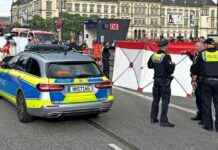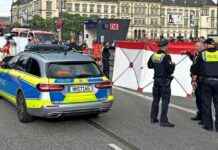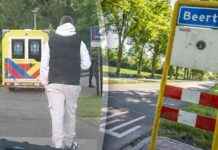It is only a few steps on foot from the Hanseatic Gun Club to the main church of St. Petri in downtown Hamburg. Philipp F. must have often passed the centrally located church on his way when he came from shooting training in the privately operated facility, housed in an office building, with his gun in his luggage.
This Sunday evening in St. Petri his victims are commemorated at an ecumenical service. Seven people died from his shots on March 9 before the 35-year-old shot himself. At the funeral service, intercessions should also be about the rescue workers and police officers, who prevented even greater suffering through their efforts, but who also experienced their own mental suffering through the images of horror.
The congregation of Jehovah’s Witnesses, which has to mourn the fatalities, will be absent despite the invitation because they prefer their own event according to their rites. And that’s just one example of how Hamburg is still struggling with the complexity of this biggest crime in the recent history of the Hanseatic city a week and a half after the crime.
It is also about the work of the police themselves – not after the killing spree, when a special unit was able to prevent an even greater bloodbath through a courageous and quick action in the community of Jehovah’s Witnesses in Groß Borstel. The focus now is on the time before that, when gun inspectors were unable to locate an inflammatory book by the later assassin on the Internet after an anonymous tip. During an unannounced visit at the beginning of February this year, they did not speak to Philipp F. about it. Hamburg’s Interior Senator Andy Grote (SPD) sees it today that knowledge of the contents of the work could have had consequences under firearms law.
The police now want to examine their own processes closely and promise public enlightenment. And at the same time, the investigators continue to investigate the area in order to find any accomplices of the murder plan. It is also about F.’s relationship with the community from which he left in 2021, “not good”, as Grote puts it. Police circles say that quite a few of the Jehovah’s Witnesses interviewed do not want to be Witnesses for the police, as this contradicts their understanding of isolation. “It’s complicated at times,” they say.
And so the public debate focuses on what is tangible – a gun was shot, Philipp F. had it approved as a marksman. Does it have to be like this? How can a gun law be designed so that such cases are prevented as far as possible?
For the Kiel professor Ulrich Hoinkes, however, the demand for a tightening of the gun law distracts from the deeper problems of the killing spree. The linguist and cultural scientist is part of an international team researching the culture of fear and how it influences social processes. “Discussing gun law issues now will not help prevent another act like this,” he told WELT AM SONNTAG.
According to Hoinkes, demanding stricter laws is often the way to deal with such events. The experts speak of securitization, i.e. the emphasis on aspects of internal security as part of the processing of the case – usually influenced by interest groups who see themselves strengthened in their view that a certain area must be regulated more closely.
But Philipp F.’s killing spree was, according to the information known so far, “very special” and with a background that was too complex to derive the consequence of a political measure. “In the US we have a completely different situation. 20,000 people are killed in shootings here every year. We are a long way from that and should also take this into account in the public debate,” says Hoinkes, who lives in Hamburg.
He sees the actual problems that the act reveals elsewhere. The lives of more and more people and their expectations of the future are determined by polyfears: by existential concerns such as financial security or their own health, by the fear of war and terror, by the fear of foreign infiltration, the climate crisis. This becomes visible, among other things, in the increasing number of people who are being treated for general anxiety disorders.
“The assassination is very significant for the development in our society,” says Hoinkes. The same applies to the knife attack on the regional train in Brokstedt. In both cases there were lone perpetrators with apparently psychological problems. One reason for this is that social structures and values offer less and less support for individuals. He therefore advises a radical rethink. “We cannot prevent individual things, but we can certainly try to change the social conditions that lead to them,” he says.
It starts with the perception of the fact. “If we’re honest, we weren’t all that surprised and think something like this had to happen. In fact, that’s the bad thing, that day by day we take it for granted that such terrible things are happening.”
For the fear researcher, this reflects a fundamental insecurity for which there should be countermeasures that are effective for society as a whole. Hoinkes and his colleagues from Columbia University in New York, among others, are also researching what these could be. “Unfortunately, there are neither easy answers nor short-term solutions.”
And so the question of whether at least shooting sports should be regulated differently in this form probably only scratches the surface. Must or may there be something like the Hanseatic Gun Club, located on the Binnenalster between hotels, restaurants and offices? Managing Director Alfred Reinecke, lawyer for weapons law and hunting law, asked for understanding that the club made “no comment” on the requested matter, and there was no information on Philipp F.’s membership either. However, Reinecke is important to point out that “our club is of course subject to the same legal requirements as any other shooting club in Germany.”
According to the Hanseatic Gun Club, after choosing the guns and the right ammunition, the following applies: “Safety first.” The member therefore receives “comprehensive instructions on how to use the new sports equipment”. The trainers also reveal “the most important tricks and tips so that you can hit the bull’s eye with the sights and grains”.
Then the customer is on the trigger and can set his sights on his target directly – during the lunch break or after work, in the middle of downtown Hamburg. Anyone who decides to become a member pays an admission fee of 250 euros and then 85 euros per month. Gift vouchers are also possible. And with the right wind direction, the bells of St. Petri can also be heard here in front of the door.




















